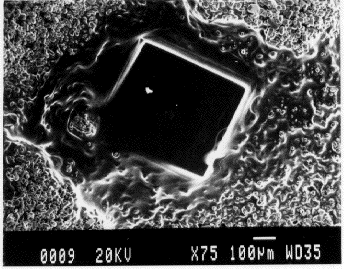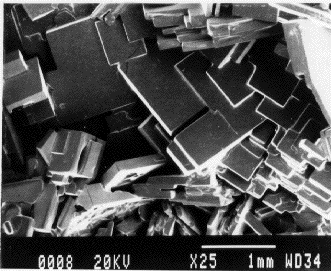
Crystals Emerging from Melt
(fabrication and electron micrograph by G.C. Spalding)
PHYS 306: Materials Physics

Crystals Emerging from Melt
(fabrication and electron micrograph by G.C. Spalding)
Required Textbooks:
1) Understanding the Properties of Matter, Second Edition, by Michael de Podesta (available at no cost, online)Outline: (A detailed Schedule of Discussions is also available)
For each of the "basic" states of matter we will examine:
Finally, we will discuss Phase Transformations between these states of matter, and will generalize those concepts to deal with transitions into many other possible states of matter:

Superconductor Crystals
(fabrication and electron micrograph by G.C. Spalding)
Highly Recommended Reference Materials include your texts from previous coursework in the physical sciences (i.e., Physics and/or Chemistry)
"Classic" References from the library (occasionally useful as supplements):
i) Gases, Liquids, and Solids: and other states of matter, by D. Tabor (e.g., for the "survival equation" associated with the kinetic theory of gases, leading to a formal derivation of the mean free path)
ii) A former student, Dan Haeger, now of Apple Computer, writes: "If anyone wants a good book for band theory introduction I'd suggest Davies, The Physics of Low-dimensional Semiconductors: an introduction. The first three chapters give a really good primer."
iii) Hammond's The Basics of Crystallography and Diffraction, a pretty good intro to x-ray diffraction, crystallography, reciprocal space, etc.
iv) Physical Chemistry, by Peter Atkins and Julio de Paula (which has often been used as the text for P-CHEM, and offers an introduction to classical thermodynamics and phase transformation concepts)
#1 Requirement: Keep up with the readings in our primary references
Complete the reading for each chapter before discussion begins in class
Because of the density of information associated with this course, it is imperative that you not lag behind in your reading. The following course requirement has been designed to aid in this regard:
If the material in your primary text is not clear at any point, it is your responsibility to seek out clarifying materials (either from your intro-level texts or other references) and to share insights with the rest of the class during our meetings. Please come to the course meetings prepared for lively discussion.
Grading: